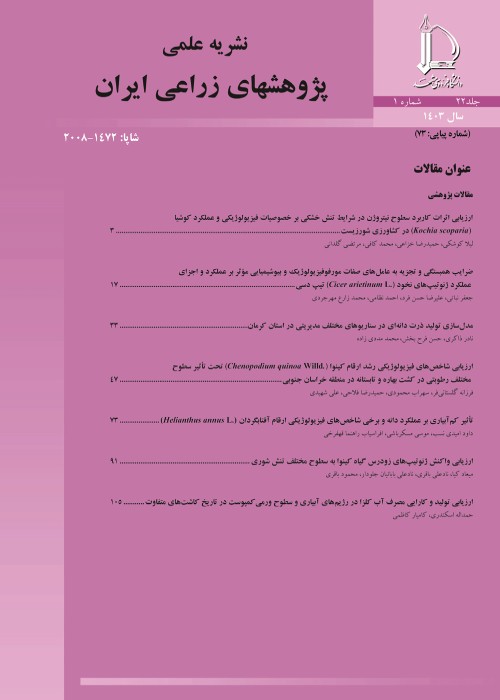Effect of Cropping System Management on Yield, Yield Components and Weed Diversity in Potato (Solanum tuberosum L.)
Potato is one of the most valuable food products. Indeed, no product has the capacity to produce energy per unit area compared with it. Potato has been an important part of the diet in most countries, especially in developing countries. Conventional cropping systems emphasize short-term goals such as high profitability and yield, and their maintenance costs are maximized due to the use of external inputs such as fertilizers and chemical pesticides, so with no use of external inputs, yield is greatly reduced. On the other hand, sustainable farming systems are systems that rely on low-energy inputs and small amounts of chemicals for long-term production stability and environmental adaptation. The purpose of this study was to investigate the effect of different cropping system management on yield, yield components and weed diversity in potato cultivation.
This experiment was conducted during the two years of 2015-2016 and 2016-2017 in the farm of Ran-Firoozkooh Cooperation Ltd., located at 10 km east of city of Firoozkooh city. The experiment was conducted as split plot arrangement based on a randomized complete block design with four replications. In this research, various agricultural management assigned to the main plots and weeding and no-weeding operations were allocated to the sub plots. Cropping systems include the high input, medium input, low input and ecological. At the early June, the potato seed tubers were planted in plots of 15 × 6 m (with a distance of 70 cm between the rows, 22 cm on the rows) in all cropping systems. At the end of the growing season (Oct, 1) potato tubers were harvested. Data were analyzed using SAS 9.1 and figures were prepared using MS-EXCEL software.
Mean comparisons showed that the highest single tuber weight (87.6 g) obtained from high input system, which was 26% higher than the low input system. The results also indicated that the weight of single tuber was increased with increasing weed control, so that the highest rate of this trait was obtained from weeding treatments. In the ecological system, the yield of the tuber in the weed control treatment was significantly different than the weedy treatment. The highest amount of tuber yield was resulted in the high input system and in weeding treatment which was significantly higher than the ecological system and the weedy treatment. In the high input system, more access to nutrients (NPK) resulting in improved yield and growth component. The phosphorus used in the high input system has different roles such as cell division, fertilization and development of reproductive organs. This can improve root and tuber development and increase water absorption and nutritional elements. Another reason for the increased yield in medium and high-input cropping systems could be assigned to the reduction of weed density in these systems. Means comparison showed that the nitrogen content of tuber in the high input system was 1.34%, which was higher than the low input system by 13%. The highest level of this trait was obtained in weeding. Plants grown in the high-input system stored more of nitrogen in their tissues due to the higher input of nitrogen fertilizer. Dzida and Jarosz (2006) reported that in a greenhouse experiment, the application of nitrogen fertilizer had a positive effect on nitrogen accumulation in the shoots of savory (Satureja hortensis). On the other hand, Derakhshan et al. (2018) stated that increasing nitrogen fertilizer is not only not beneficial to the crop, but also complicates the weed problem, in which case weeds absorb nutrients faster and more than the crop. There was a negative correlation between increasing the use of inputs and Shannon-Wiener index, so that ecological system (1.32), which was without the use of inputs, had the highest rate of this index and the lowest one was observed in the high input system (0.87). The main reason for the loss of biodiversity in conventional farms compared with low and ecological systems seems to be the intensification of agricultural operations, which is associated with excessive consumption of inputs, including herbicides.
In general, the results of this study showed that with increasing input, yield and yield components of potatoes increased. The results also showed that the highest amount of nitrogen was observed in tubers, potato shoots and also in weed tissues in the high input system and therefore it can be suggested that more use of chemical fertilizers has resulted in more nitrogen storage in different plant tissues. On the other hand, with the decrease in the input in ecological and low-input systems, the amount of Shannon-Wiener diversity index increased so that the highest amount of this index was observed in ecological and low-input systems. Considering the reduction of environmental pollution in ecological systems, it seems that such systems are environmentally friendly and if such services can be valued, the ecological system will be more superior compared with the conventional ones.
- حق عضویت دریافتی صرف حمایت از نشریات عضو و نگهداری، تکمیل و توسعه مگیران میشود.
- پرداخت حق اشتراک و دانلود مقالات اجازه بازنشر آن در سایر رسانههای چاپی و دیجیتال را به کاربر نمیدهد.


